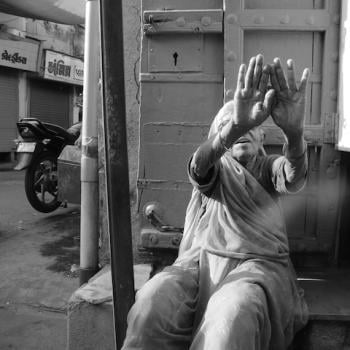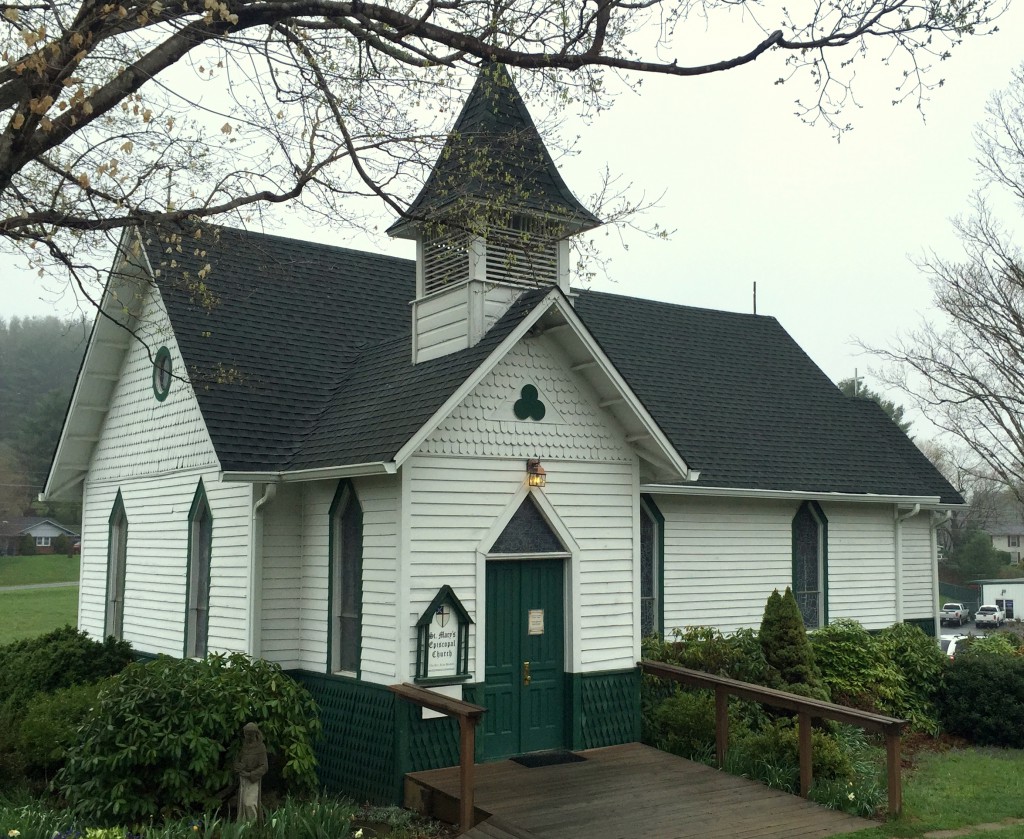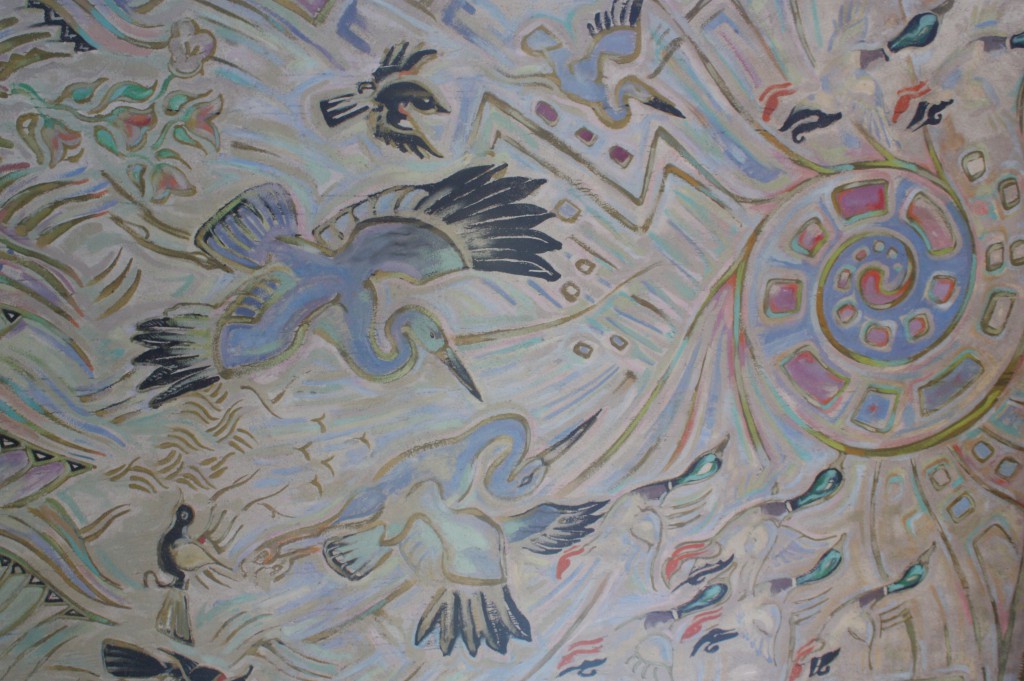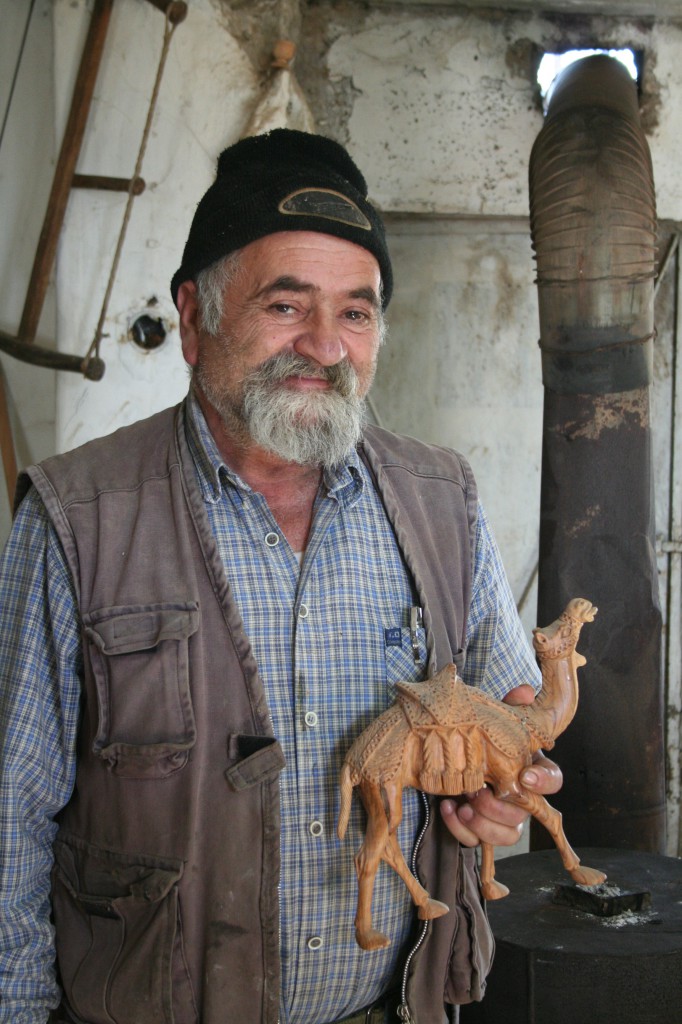
As Christmas approaches, I find myself thinking of my visit to Bethlehem last January. In particular, I remember meeting Palestinian Christians in Bethlehem who create handcrafted items made from locally grown olive trees. In a very tough part of the world, they are keeping alive a tradition that dates back to the earliest years of the Christianity.
I wrote an article on these woodcarvers that’s in the current issue of the Catholic magazine St. Anthony Messenger. Even if you can’t visit Bethlehem, you can still support the work of these artists by purchasing gifts through the Bethlehem Fair Trade Artisans (the organization also welcomes the chance to work with churches and non-profits on a consignment basis). These are good people doing beautiful work, and they need our support. Here’s more information on their story:
SINCE THE EARLY 1940s, members of the Sway family of Bethlehem have been carrying on a tradition with deep spiritual roots. Here in the town where Jesus was born, olive-wood carvings have long been crafted both as a biblical teaching tool and as a source of income in an economically distressed part of the world. Using wood pruned from local olive trees, over the decades the Sway family has skillfully carved a wide range of figures: kindly Josephs, beatific Marys, regal camels, humble shepherds, and tiny infants that represent the humbling of God into human form.
“We tell the Nativity story in a way everyone can understand,” says Elia Sway, a Palestinian Christian who learned his skills from his grandfather. He now works with his son Iyad in a workshop attached to their home, a short distance from the Church of the Nativity in Bethlehem.
While Christians around the world set up small crèches in their homes each Christmas, carved figures from Bethlehem carry a special resonance and meaning. In addition to being made in one of the holiest sites in Christianity, olive-wood carvings from the Holy Land have other symbolic associations. The Bible is full of references to olive trees, from Jesus praying under an olive tree in the Garden of Gethsemane to Noah receiving an olive branch from a dove as a sign the great flood had receded. Olive-wood carving has been an honored craft in Bethlehem for many centuries. Helena, the mother of the Roman emperor Constantine, visited the Holy Land in the fourth century and directed that churches be built on the major sites associated with Jesus’ life.
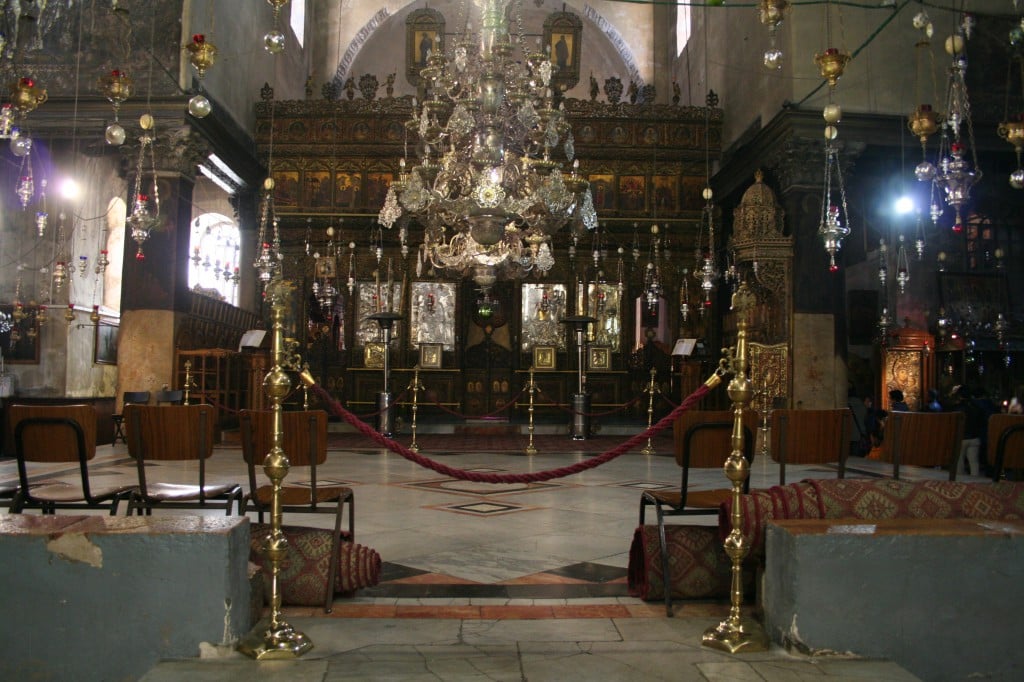
In Bethlehem, the Church of the Nativity was constructed over the grotto that local tradition associated with the birth of Jesus. Monks came to live in the area and taught local craftsmen how to make figures that could be used to teach the biblical story. In doing so, of course, the artisans followed the example of Jesus, who also knew his way around a woodshop.
As any visitor to the Holy Land knows, olive-wood figures are widely available in tourist shops throughout the region. Unfortunately, many are mass-produced, cheaply made imports. Even those that are made locally are often sold under a system that takes unfair advantage of the artisans, who keep only a small percentage of the sale price.
The political tensions between Israelis and Palestinians have also brought increasing economic hardship to the area. Bethlehem lies on the West Bank in the Palestinian Territory, and since 2002 greater security restrictions and a wall constructed at the border have made it much more difficult for Palestinians to travel back and forth across the border to work in Israel. The troubles have also led to declines in the number of tourists coming to Bethlehem, further hurting the economic health of the region.
Wissam Qumsieh is one of many Palestinians whose lives have been dramatically altered by the wall’s construction. A native of Beit-Sahour near Bethlehem, Qumsieh once worked a construction job in Jerusalem, but after the building of the wall he was prohibited from entering the city and became unemployed. Though his wife’s American citizenship would allow Qumsieh and his family to move overseas, he has decided to stay. “If I leave, I feel like I would be hurting my people and my nation,” he says. “There is a future for us here if we work to create it.”
With his former occupation closed to him, Qumsieh taught himself how to shape olive wood, a craft that is difficult to learn. “Olive-wood carving takes years to fully master because it is very precise and detailed,” he says.
Family members often work together in small, home-based workshops, making most of the carvings by hand. When completed, the olive-wood pieces are varnished and need no other care than dusting.
Increasingly, Bethlehem artists are adding other handcrafts to their repertoire, such as embroidery, mother-of-pearl items, crafts from recycled materials, olive-oil soap, and handmade jewelry. Sawsan Rishmawi learned how to make recycled glass and silver jewelry at Bethlehem’s Dar Al-Nadwa Center—where classes in a wide variety of arts and crafts are held—and then taught her four sisters the skills.
In Rishmawi’s home-based workshop, she and her sisters fashion angels, Nativity sets, and other figures from recycled glass, as well as silver necklaces, rings, and bracelets, many based on an olive-tree leaf pattern. She takes great pride in how the business helps them be economically independent. “Here in Palestine, we have strong families and a long tradition of working together to help provide for each other,” Rishmawi says.
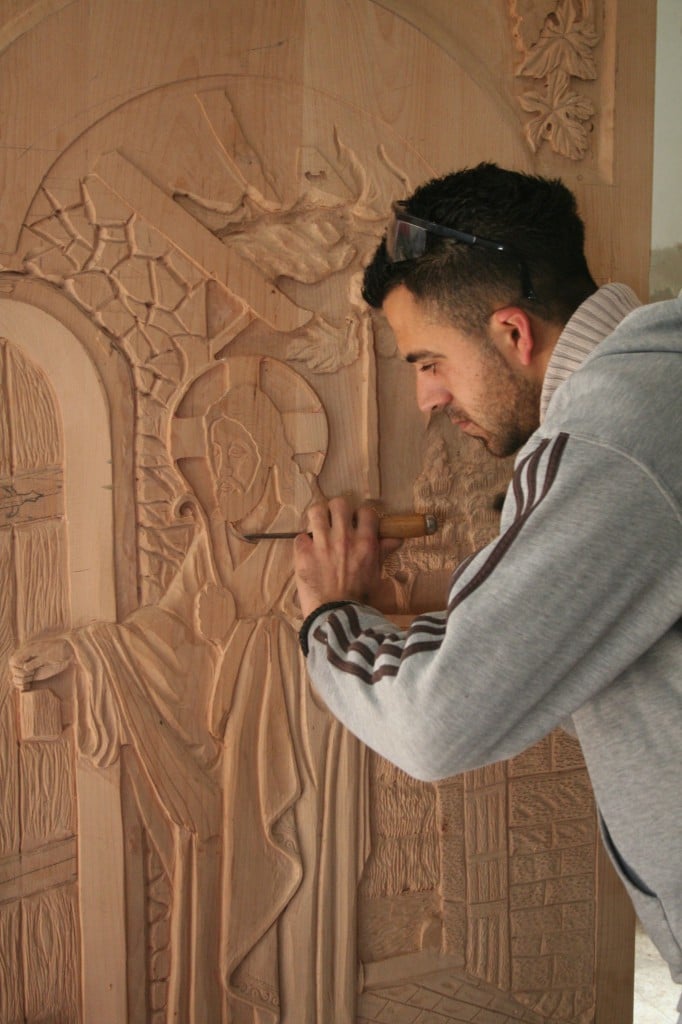
The artisans of Bethlehem wish to tell the larger world not only about the quality of their products, but also that it is safe for Christian pilgrims to visit Bethlehem. Tourists have no difficulties going through the border checkpoints and are warmly welcomed in this city of 30,000, located just five miles south of Jerusalem.
Bernadette Heath of Star Valley, Arizona, got the chance to visit the Elia and Iyad Sway family workshop in January 2011 and considers it a highlight of her trip to the region. “I’ve collected olive-wood carvings for years, and it was very meaningful for me to meet Elia and Iyad, tour their workshop, and purchase a piece that Elia had made,” says Heath. “I also appreciated being able to learn firsthand about the lives of Palestinian Christians in the Holy Land and see how the old artistic traditions of Bethlehem are being carried on.”
In the Sway workshop, 28-year-old Iyad is eager to expand the boundaries of his craft and has learned how to make beautifully carved wooden doors that feature biblical scenes. The striking works of art adorn the entrances to a growing number of churches in the region, as well as sanctuaries as far away as the United States. While constructed of pine rather than olive wood, which doesn’t come in large enough pieces for such a project, the doors are both objects of beauty and a tangible link to Jesus’ birthplace.
“I want to take the skills I learned from my father and use them in new ways to tell the story of Jesus,” says Iyad. “And it pleases me very much to think of my work being used in many places around the world.”
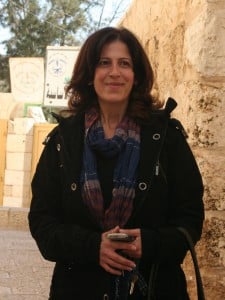
Advocates for the Artisans of Bethlehem
THE ECONOMICALLY difficult situation faced by Bethlehem craftspeople led to the founding of the Bethlehem Fair Trade Artisans (BFTA) in 2009. “It’s very difficult for individual artists to compete in the larger marketplace, but by banding together they can receive a fair price for their work and better promote their products,” says Suzan Sahori, cofounder and executive director of the nonprofit organization, which is based in a building not far from Manger Square in Bethlehem.
Fair trade blends social responsibility with commerce. Its goal is to create economic partnerships that support sustainable development and safeguard marginalized workers. In Bethlehem, that commitment extends to environmental sustainability as well. BFTA ensures that the carvings done by its workers are made only from the clippings from olive trees, which must be regularly pruned in order to remain healthy and produce ample crops. The trees are economically essential in this dry and hot region, producing two harvests a year (green olives in the spring and black olives in the fall). The olives can be eaten or made into oil, and wood carvings made from discarded branches further increase the productivity of the trees.
BFTA represents 90 workshops employing about 1,000 people. It offers classes in new crafts and designs, as artisans can often boost their incomes by offering a wider range of products, and also sponsors English classes, teaches marketing skills, and advocates for improved working conditions for the artisans. Its support services are particularly important for women and disabled workers, who find it difficult to compete in the region’s job market.
Mervet Jackaman is a BFTA member who has benefited from its business classes. After her husband lost his job as a construction worker because of undergoing open-heart surgery, she became the main financial support for her family, which includes three boys and one girl. After learning how to work with recycled glass at Bethlehem’s Dar Al-Nadwa Center, she opened her own business. “As a small business owner in a difficult economy, I knew that in order to improve and sustain my business I needed more knowledge about commerce,” she says. “I took BFTA courses in enterprise management and entrepreneurship, where I learned skills like how to price and package my products and how to market my work. That knowledge has helped me a great deal in my business.”
Primarily funded through grants and donations, BFTA keeps only a small portion of its sales for administrative costs. Its prices are competitive (and often less expensive than other stores in the area), and customers benefit as well by knowing that their shopping dollars go directly to the artisans who created the pieces.
Visitors to Bethlehem can purchase a wide range of BFTA handcrafts in a showroom off Manger Square. The organization can also arrange tours of the city’s holy sites and introduce visitors to the artisans who work in the area, allowing them to see how the crafts are made and hear stories of the daily lives of Palestinians in the West Bank.
Bethlehem Fair Trade Artisans welcome orders from the United States. Churches looking for fundraiser items or wanting to stock alternative gift fairs at Christmas are a growing market for the nonprofit group. They are happy to work with churches on a consignment basis.



